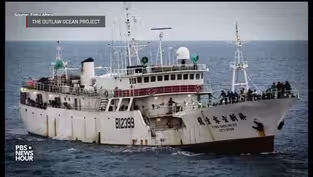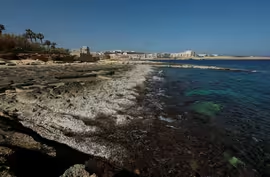
UN aid chief on far-reaching consequences of dam collapse
Clip: 6/15/2023 | 9m 17sVideo has Closed Captions
UN aid chief on far-reaching consequences of Ukrainian dam disaster
In Ukraine, floodwaters are receding more than a week after the destruction of a major dam that severely inundated surrounding towns. But the damage is evolving into a long-term environmental and humanitarian disaster with far-reaching consequences. Martin Griffiths is the humanitarian affairs chief for the United Nations and joined Geoff Bennett to discuss the relief effort.
Problems playing video? | Closed Captioning Feedback
Problems playing video? | Closed Captioning Feedback
Major corporate funding for the PBS News Hour is provided by BDO, BNSF, Consumer Cellular, American Cruise Lines, and Raymond James. Funding for the PBS NewsHour Weekend is provided by...

UN aid chief on far-reaching consequences of dam collapse
Clip: 6/15/2023 | 9m 17sVideo has Closed Captions
In Ukraine, floodwaters are receding more than a week after the destruction of a major dam that severely inundated surrounding towns. But the damage is evolving into a long-term environmental and humanitarian disaster with far-reaching consequences. Martin Griffiths is the humanitarian affairs chief for the United Nations and joined Geoff Bennett to discuss the relief effort.
Problems playing video? | Closed Captioning Feedback
How to Watch PBS News Hour
PBS News Hour is available to stream on pbs.org and the free PBS App, available on iPhone, Apple TV, Android TV, Android smartphones, Amazon Fire TV, Amazon Fire Tablet, Roku, Samsung Smart TV, and Vizio.
Providing Support for PBS.org
Learn Moreabout PBS online sponsorshipGEOFF BENNETT: In Ukraine, floodwaters are receding more than a week after the destruction of a major dam that severely inundated surrounding towns.
But the damage is evolving into a long-term environmental and humanitarian disaster, with far-reaching consequences.
Thousands of people have been displaced, hundreds of thousands left without normal access to drinking water, and Ukraine fears losing millions of tons of crops.
Martin Griffiths is the humanitarian affairs chief for the United Nations and joins us now to talk about the relief effort in Ukraine and in other parts of the world.
Thank you for being with us.
The scale of destruction following that dam collapse is enormous, some 700,000 people without access to drinking water.
How is your team on the ground addressing the immense challenge of providing humanitarian aid to those affected?
MARTIN GRIFFITHS, U.N. Undersecretary-General for Humanitarian Affairs and Emergency Relief Coordinator: Well, right now, we're reaching about 200,000 people.
And we do this through a whole series of daily convoys, delivering aid, but also helping evacuation for those that need to leave.
We're very worried about the secondary consequences, which you have been mentioning; 700,000 people have been robbed of safe drinking water as a result of that catastrophe.
GEOFF BENNETT: Last week, Ukraine's President Zelenskyy, as I'm sure you know, said he was -- quote -- "shocked" at what he called the initial failure of the U.N. and the Red Cross to help after the dam was destroyed.
How do you respond to that criticism?
MARTIN GRIFFITHS: Well, I respond by saying that I completely understand his frustration.
And it's a frustration which comes from a leader who has enormous empathy with his people.
It's true that response to sudden disasters like that, whether it's a dam blown up or an earthquake, as we saw in Syria and Turkey recently, getting aid to the people immediately is sometimes a frustration.
But we were there later that day.
And, as I say, we have reached 200,000 people so far.
GEOFF BENNETT: Ukraine says that Russia is shelling boats trying to evacuate residents from inundated areas.
There are documented instances of Russian officials shutting down routes to affected areas and, in some cases, blocking volunteers who try to deliver help.
As you see it, is Russia actively sabotaging the relief effort?
MARTIN GRIFFITHS: I don't know the answer to that question.
What I do know is that we are seeking access to the other side of the river, to the side which is under Russian occupation.
And we, in seeking the understanding of the Russian Federation, as well as, of course, Ukraine, to enable us to do that, and we're standing by ready to cross that river, because we haven't had access to the many, many thousands of people across that front, across the line of conflict.
GEOFF BENNETT: Do you expect that will change?
Last week, as I understand it, you met with Russia's U.N. ambassador to talk about this?
MARTIN GRIFFITHS: Yes, I did.
And it was a useful conversation.
And we have subsequently put into play what we call a humanitarian notification system.
And we have notified the two -- the Russian Federation and Ukraine of our plan, and we're seeking their reaction to it as we speak.
And I hope it works.
I hope we're able to do it.
GEOFF BENNETT: There's also, of course, the domino effect of these floods.
It has inundated agricultural areas, which means that there will be a likely much lower grain export, which will lead to higher prices around the globe and less for people to eat.
How is the U.N. planning to confront that specific challenge?
MARTIN GRIFFITHS: We have an operation in the Black Sea to take Ukrainian grain across the Black Sea and out to the world.
I worry a lot about the effect on global food prices and, as much as anything, on global food availability.
We will see the extent of that damage as the waters recede.
It is a catastrophe for the world.
GEOFF BENNETT: A question about that grain deal.
President Putin said that he is thinking about walking away from that deal when it expires next month.
How real is that possibility?
And what might convince him to stay?
MARTIN GRIFFITHS: My response would be, that is, don't let the Black Sea initiative fail, because the needs of the people in the global South, the needs of global food security are as keen now as ever.
And, as you know, there will be a visit of six heads of state of African countries to Kyiv and to the Russian Federation in the next few days.
They will be making that message very, very clear.
GEOFF BENNETT: As you mentioned those African countries, let's shift our focus to Sudan, because more than half of that population stands in dire need of humanitarian assistance.
Large parts of the country remain inaccessible to aid.
Millions of people have been confined to their homes.
What kind of challenge does the crisis in Sudan present to the U.N.?
MARTIN GRIFFITHS: I think it's massive.
There's nowhere in the world that I'm more worried than I am today about Sudan.
There are just shy of nine million people in Darfur who need humanitarian aid and who have not received any aid, since the two months of this particular conflict.
We have been trying to get aid in there, whether from across the border in Chad or from the Eastern Sudan, and we have failed to get the necessary assurances from the two militaries to allow it to deliver safely.
That's an extraordinary priority for all of us.
Just under half-a-million people have left Sudan in these 10 weeks to find safety in the neighboring countries, many of those countries fragile themselves.
So, I'm very worried about how it's evolving.
And we look to see the African Union, of course, take a lead in actually bringing a resolved end to the conflict as soon as possible.
GEOFF BENNETT: The Taliban has banned most women from working for national and international NGOs.
That has affected the delivery of aid across that country.
Last time we spoke with you on this program, you said the Taliban was working on guidelines to allow women to get back to work.
It's now been six months.
Has there been any progress?
MARTIN GRIFFITHS: We haven't seen the guidelines.
That's for sure.
Promises don't allow women to work.
We need to see a reality that needs to change.
And those edicts need to be revoked.
What we're doing at the moment, Geoff, in Afghanistan is to work for women, with women through principally Afghan NGOs, of course, because of the exemptions and exceptions and permissions that we can obtain from the Taliban, both nationally and regionally.
An exception doesn't prove the rule.
An exception still means that women and girls in Afghanistan are a repressed minority or, indeed, majority.
We need to see some sort of a viability of the reentry into the life of the country.
And that will also mean that the international community can engage to give the people of Afghanistan a proper chance, not just through humanitarian aid, but through the help for the economy, help to counterterrorism, all the aspects which make the safety of Afghanistan important for all of us.
GEOFF BENNETT: As we wrap up our conversation, I read where you once said humanitarians want to be driven out of business by the resolution of conflicts.
But it strikes me that the work that you and your team do is now needed more than ever.
How do you see it?
MARTIN GRIFFITHS: It's terrifying.
We have this under-$60 billion program around the world this year.
We will probably get half of that funded.
It's increasing enormously.
We have 340 million people around the world who need humanitarian aid.
That's equivalent to the third largest country in the world without its population.
And what's needed is for people to stop thinking that war solves the problems of their state.
The people need to understand that casual acts of violence have long-term consequences.
We say that because we're there in those front lines, Geoff, that you mentioned, but everybody knows this be true.
This is a common message for all of us.
GEOFF BENNETT: Martin Griffiths is the humanitarian affairs chief for the United Nations.
Thank you for your time.
MARTIN GRIFFITHS: Thanks very much.
Investigation reveals rampant human rights abuses at sea
Video has Closed Captions
Clip: 6/15/2023 | 9m 49s | Investigation reveals rampant environmental and human rights abuses at sea (9m 49s)
A look at the life of actor turned politician Glenda Jackson
Video has Closed Captions
Clip: 6/15/2023 | 6m 44s | A look at the life of actor turned politician Glenda Jackson (6m 44s)
On the frontline with Ukrainian counteroffensive forces
Video has Closed Captions
Clip: 6/15/2023 | 5m 31s | On the frontline with Ukrainian forces as they step up counteroffensive against Russia (5m 31s)
Scientists issue dire warnings as ocean temperatures spike
Video has Closed Captions
Clip: 6/15/2023 | 6m 35s | Scientists issue increasingly dire warnings as ocean surface temperatures spike (6m 35s)
Southern Baptist Convention votes to ban female pastors
Video has Closed Captions
Clip: 6/15/2023 | 8m 33s | Southern Baptist Convention bans female pastors, ejecting several churches in the process (8m 33s)
Providing Support for PBS.org
Learn Moreabout PBS online sponsorship
- News and Public Affairs

FRONTLINE is investigative journalism that questions, explains and changes our world.

- News and Public Affairs

Amanpour and Company features conversations with leaders and decision makers.












Support for PBS provided by:
Major corporate funding for the PBS News Hour is provided by BDO, BNSF, Consumer Cellular, American Cruise Lines, and Raymond James. Funding for the PBS NewsHour Weekend is provided by...




